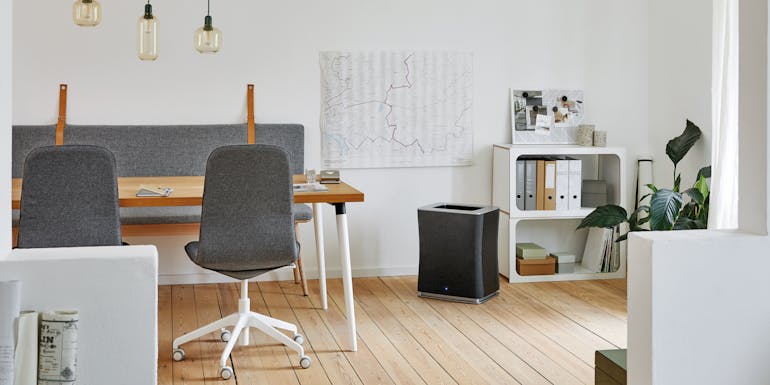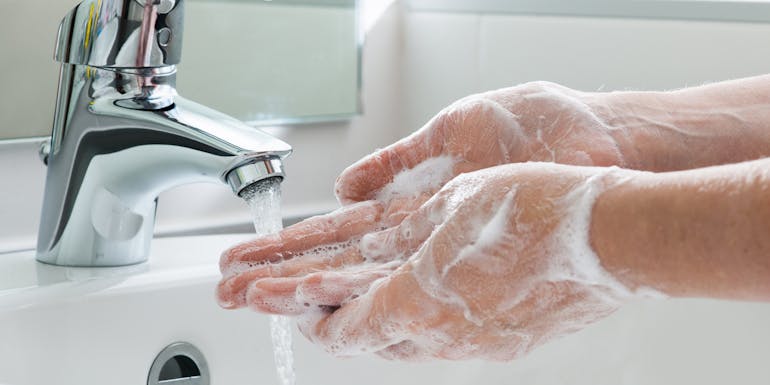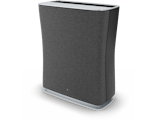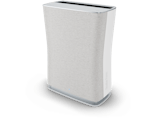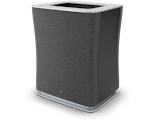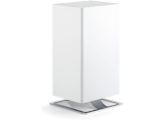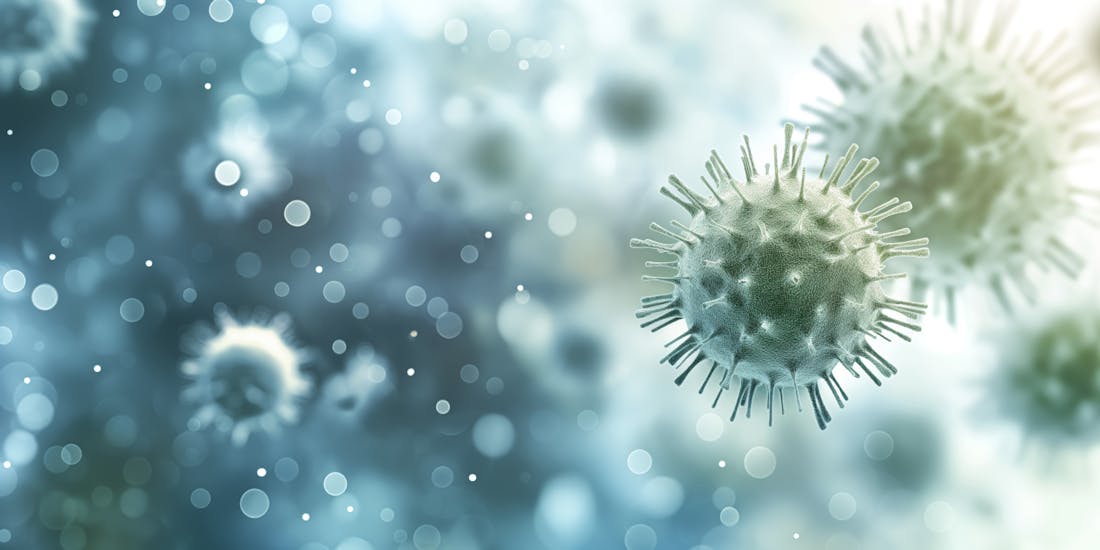
Nadine Walder, 27 November 2024
Purify the air
Do air purifiers help against viruses and bacteria?
Clean air is essential for our well-being and health – especially in closed rooms where we spend most of our time. Viruses and bacteria that spread in the air pose an invisible danger here. Especially during cold and flu season or in times of pandemics, the question arises as to how transmission risks can be minimised indoors and whether an air purifier is a useful tool. In this article, you will find out how viruses and bacteria spread indoors, how an air purifier can help combat this and what you should consider when buying one.
Read on to find out:
- Spread of viruses and bacteria in indoor air
- Air purifier against viruses and bacteria: Does it make sense?
- What should I consider when buying an air purifier against viruses and bacteria?
- Further tips for minimising the transmission of viruses and bacteria
Spread of viruses and bacteria in indoor air
To answer the question of whether an air purifier is useful for viruses and bacteria, we first need to look at how these pathogens spread indoors. A basic distinction is made between two types of transmission: droplet infection (transmission through the air) and contact infection (transmission through surfaces). Air purifiers can play a decisive role in the first type.
Viruses and bacteria enter the air via various routes and quickly accumulate indoors. When speaking, sneezing or coughing, droplets of saliva are released into the air, which can contain pathogens. Larger droplets (over 5 micrometers) sink to the ground relatively quickly, while smaller droplets (under 5 micrometers), known as aerosols, remain in the air for longer.
In poorly ventilated rooms without an adequate supply of fresh air, aerosols and the pathogens they contain can accumulate. This significantly increases the likelihood of infection. The risk of aerosol transmission is particularly high in enclosed spaces with many people, such as offices, classrooms or public transport. Especially in the cold season, when the air is very dry, aerosols spread even better and remain in the air for longer.
As viruses and bacteria often remain in the air indoors for a long time and can spread unhindered, the question arises as to how this invisible danger can be minimised. Air purifiers come into play when it comes to filtering contaminated air. But how useful are they really when it comes to removing viruses and bacteria from the air?
Air purifier against viruses and bacteria: Does it make sense?
Air purifiers can play an important role in combating viruses and bacteria indoors. Various studies, which are presented below, have shown – particularly in connection with the coronavirus – that high-quality air purifiers can filter more than 99.99 % of viruses and bacteria from the air. Most air purifiers work with a multi-stage filter system. HEPA filters are particularly effective in combating viruses and bacteria. These filters consist of a dense network of fibres that capture the smallest particles. HEPA filters can filter not only dust and pollen, but also aerosols and the viruses and bacteria they contain from the air.
Researchers at the University of the Bundeswehr Munich, for example, found that an air purifier with HEPA H14 filters can reduce the aerosol concentration in a room with a size of 80 m2 to a low level everywhere within a short time and concluded that air purifiers with high-quality filters and a high volume flow are a sensible technical solution to greatly reduce the risk of infection from aerosols.
Atmospheric researchers at Goethe University Frankfurt analysed the use of air purifiers in classrooms in a study. The researchers conducted a controlled experiment with two classrooms: air purifiers were installed in one room and not in the other. The study showed that air purifiers can filter 90 % of aerosols from the air in school classrooms. The reduction in aerosol concentration was significantly higher in the room with air purifiers than in the other classroom.
The Stadler Form air purifiers of the Roger family have also been tested by an independent laboratory for their ability to reduce viruses. The test results show that the Roger air purifier can remove 99.3 % of the viruses used from the air. The reduction of viruses was verified in the independent laboratory of Airmid in the UK. The virus used in the test was MS2. This virus is often used in air purifier tests because it has similar aerosol properties to other human viruses, is viable and resistant to disinfection.
Air purifiers with appropriate filter systems can therefore be a useful addition to other hygiene measures. They offer measurable protection against airborne pathogens and are particularly useful in closed rooms where regular ventilation is difficult or many people come together. However, it is important to note that even air purifiers do not offer complete protection but should be used as part of a comprehensive hygiene concept. There are a few things to consider when buying an air purifier to combat viruses and bacteria.
What do I need to consider when buying an air purifier against viruses and bacteria?
Not every air purifier is equally effective. When buying an air purifier, you should consider the following aspects:
- Filter technology: Air purifiers with a HEPA filter are particularly effective against viruses and bacteria. If you also want to filter gases and unpleasant odours from the air, you should opt for a combination of HEPA and activated carbon filters.
- Room size and CADR value: The air purifier must be adapted to the room size so that it can effectively minimise viruses and bacteria. Also pay attention to the so-called CADR value (Clean Air Delivery Rate). This indicates how much air per hour is purified.
- Noise level: For use in living rooms, offices, classrooms and bedrooms, the appliance should work as quietly as possible. Pay attention to the decibel rating of the air purifier when purchasing.
- Maintenance: Find out about the service life and replacement cycle of the filters before you buy them, as they need to be replaced regularly so that they can effectively filter viruses and bacteria out of the air.
Further tips for minimising the transmission of viruses and bacteria
In addition to using an air purifier, there are other measures to reduce the transmission of pathogens:
- Regular airing: Ensure a continuous exchange of air by regularly airing the room to reduce the concentration of aerosols.
- Hygiene measures: Wash and disinfect your hands regularly with soap to avoid infection via surfaces (contact infection). Also, regularly clean and disinfect surfaces such as door handles, light switches, mobile phone screens and tables.
- Coughing rules: Cough and sneeze into a handkerchief if possible or, if not available, into the crook of your elbow. This reduces the spread of viruses and bacteria.
- Keep your distance: Stay away from and keep your distance or wear a face mask if you have a cold or are ill yourself. Especially at times when there are flu epidemics, you should avoid busy indoor spaces and refrain from shaking hands or hugging.
Together with these general measures, an air purifier with suitable filter technology is a useful addition to reduce pathogens in the room air. They are particularly useful in poorly ventilated rooms and where there is an increased risk of infection. When buying an air purifier, pay particular attention to the appropriate filters, the room size and the CADR value.
Would you like to find out more about air purification? On our information page you will find useful tips and tricks as well as everything you need to know about indoor air purification.
If you have questions related to indoor room climate, please get in touch with us. Or subscribe to our newsletter to regularly get informed about current topics regarding indoor climate, experience reports or Stadler Form insights.

